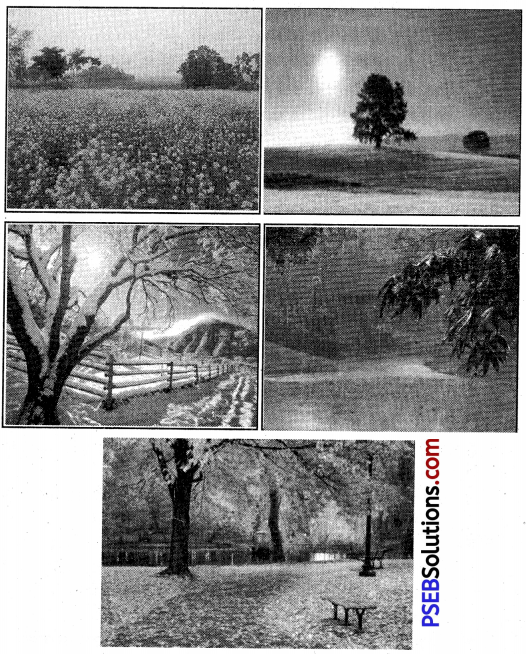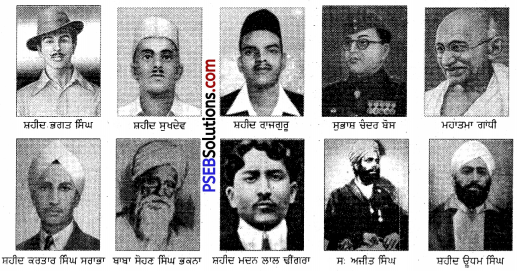Punjab State Board PSEB 7th Class Punjabi Book Solutions Chapter 6 ਯਾਤਰਾ : ਹੇਮਕੁੰਟ ਸਾਹਿਬ Textbook Exercise Questions and Answers.
PSEB Solutions for Class 7 Punjabi Chapter 6 ਯਾਤਰਾ : ਹੇਮਕੁੰਟ ਸਾਹਿਬ
ਪ੍ਰਸ਼ਨ 1.
ਹੇਮਕੁੰਟ’ ਸ਼ਬਦ ਦੇ ਅਰਥ ਦੱਸੋ । ਹੇਮਕੁੰਟ ਸਾਹਿਬ ਰਾਤ ਨੂੰ ਕੋਈ ਕਿਉਂ ਨਹੀਂ ਠਹਿਰ ਸਕਦਾ ?
ਉੱਤਰ :
ਹੇਮਕੁੰਟ’ ਸ਼ਬਦ ਦੇ ਅਰਥ ਹਨ ‘ਬਰਫ਼ ਦਾ ਸਰੋਵਰ’ । ਇਹ ਸਥਾਨ ਸਮੁੰਦਰ ਤਲ ਤੋਂ 15000 ਫੁੱਟ ਉੱਚਾ ਹੋਣ ਕਰਕੇ ਇੱਥੇ ਆਕਸੀਜਨ ਦੀ ਘਾਟ ਹੁੰਦੀ ਹੈ । ਇਸ ਕਰਕੇ ਰਾਤ ਨੂੰ ਇੱਥੇ ਕੋਈ ਠਹਿਰ ਨਹੀਂ ਸਕਦਾ ।

ਪ੍ਰਸ਼ਨ 2.
ਹੇਮਕੁੰਟ ਸਾਹਿਬ ਸਰਦੀਆਂ ਵਿਚ ਕਿਉਂ ਨਹੀਂ ਜਾਇਆ ਜਾ ਸਕਦਾ ?
ਉੱਤਰ :
ਹੇਮਕੁੰਟ ਸਾਹਿਬ ਸਰਦੀਆਂ ਵਿਚ ਬਹੁਤ ਬਰਫ਼ ਪੈਂਦੀ ਹੈ, । ਇਸ ਕਰਕੇ ਇੱਥੇ ਸਰਦੀਆਂ ਵਿਚ ਨਹੀਂ ਜਾਇਆ ਜਾ ਸਕਦਾ ।
ਪ੍ਰਸ਼ਨ 3.
ਸ੍ਰੀਨਗਰ ਸ਼ਹਿਰ ਦੀ ਕੀ ਮਹੱਤਤਾ ਹੈ ?
ਉੱਤਰ :
ਸ੍ਰੀਨਗਰ ਬੜਾ ਪ੍ਰਸਿੱਧ ਅਤੇ ਇਤਿਹਾਸਿਕ ਸਥਾਨ ਹੈ । ਇੱਥੇ ਗੜ੍ਹਵਾਲ ਯੂਨੀਵਰਸਿਟੀ ਦਾ ਕੈਂਪਸ ਹੈ । ਕਿਹਾ ਜਾਂਦਾ ਹੈ ਕਿ ਸੁਮੇਰ ਪਰਬਤ ਨੂੰ ਜਾਂਦੇ ਹੋਏ ਗੁਰੂ ਨਾਨਕ ਦੇਵ ਜੀ ਇੱਥੇ ਰੁਕੇ ਸਨ ।
ਪ੍ਰਸ਼ਨ 4.
ਜੋਸ਼ੀ ਮਠ ਦੀ ਮਹੱਤਤਾ ਬਾਰੇ ਆਪਣੇ ਸ਼ਬਦਾਂ ਵਿਚ ਲਿਖੋ ।
ਉੱਤਰ :
ਜੋਸ਼ੀ ਮੱਠ ਹਿੰਦੂਆਂ ਦਾ ਪ੍ਰਸਿੱਧ ਤੀਰਥ ਸਥਾਨ ਹੈ । ਕਿਹਾ ਜਾਂਦਾ ਹੈ ਕਿ ਇਹ ਸਥਾਨ ਸ਼ੰਕਰਾਚਾਰੀਆ ਵਲੋਂ ਸਥਾਪਿਤ ਕੀਤੇ ਚਾਰ ਮੱਠਾਂ ਵਿਚੋਂ ਇਕ ਹੈ । ਇਹ ਆਲੇ-ਦੁਆਲੇ ਪਹਾੜੀਆਂ ਵਿਚ ਘਿਰਿਆ ਸ਼ਾਨਦਾਰ ਨਜ਼ਾਰਾ ਪੇਸ਼ ਕਰਦਾ ਹੈ । ਇੱਥੇ ਕਈ ਮੰਦਰ ਹਨ ।

ਪ੍ਰਸ਼ਨ 5.
ਗੋਬਿੰਦਘਾਟ ਤੋਂ ਹੇਮਕੁੰਟ ਸਾਹਿਬ ਦੀ ਯਾਤਰਾ ਦਾ ਵਰਣਨ ਕਰੋ ।
ਉੱਤਰ :
ਗੋਬਿੰਦਘਾਟ ਵਿਖੇ ਇਕ ਬਹੁਤ ਵੱਡਾ ਗੁਰਦੁਆਰਾ ਹੈ, ਜੋ ਅਲਕ ਨੰਦਾ ਨਦੀ ਦੇ ਕੰਢੇ ਉੱਤੇ ਬਣਿਆ ਹੋਇਆ ਹੈ । ਅਲਕ ਨੰਦਾ ਬੜੀ ਤੇਜ਼ੀ ਨਾਲ ਵਗਦੀ ਹੈ । ਨਦੀ ਦੇ ਵਹਾਓ ਦਾ ਸੰਗੀਤ ਕੰਨਾਂ ਨੂੰ ਸੁਣਦਾ ਹੈ । ਚਾਰੇ ਪਾਸੇ ਹਰਿਆਵਲ ਹੈ । ਗੋਬਿੰਦਘਾਟ ਤੋਂ ਅੱਗੇ ਗੋਬਿੰਦਧਾਮ ਤਕ 13-14 ਕਿਲੋਮੀਟਰ ਦਾ ਰਸਤਾ ਪੈਦਲ ਤੈ ਕਰਨਾ ਪੈਂਦਾ ਹੈ । ਕੁੱਝ ਲੋਕਇਹ ਸਫ਼ਰ ਘੋੜਿਆਂ ‘ਤੇ ਕਰਦੇ ਹਨ | ਰਸਤਾ ਉਬੜ-ਖਾਬੜ ਹੈ । ਸ਼ਾਮ ਨੂੰ ਯਾਤਰੀ ਗੋਬਿੰਦਧਾਮ ਪੁੱਜ ਜਾਂਦੇ ਹਨ । ਇੱਥੇ ਰਸਤੇ ਵਿਚ ਇਕ ਵੱਡਾ ਗਲੇਸ਼ੀਅਰ ਆਉਂਦਾ ਹੈ ਤੇ ਸਰਦੀਆਂ ਵਿਚ ਠੰਢ ਹੁੰਦੀ ਹੈ । ਗੋਬਿੰਦਧਾਮ ਤੋਂ ਹੇਮਕੁੰਟ ਸਾਹਿਬ 6-7 ਕਿਲੋਮੀਟਰ ਦੀ ਦੂਰੀ ਤੇ ਹੈ । ਇਹ ਚੜ੍ਹਾਈ ਸਿੱਧੀ ਹੈ । ਰਸਤਾ ਬਹੁਤ ਕਠਿਨ ਹੈ ਪਰ ਰਸਤੇ ਦੇ ਨਜ਼ਾਰੇ ਬਹੁਤ ਸੁੰਦਰ ਹਨ । ਚਾਰੇ ਪਾਸੇ ਬਰਫ਼ ਦੇ ਪਹਾੜ ਦਿਸਦੇ ਹਨ । ਸੂਰਜ ਦੀਆਂ ਕਿਰਨਾਂ ਪੈਣ ਨਾਲ ਬਰਫ਼ ਸੋਨੇ ਵਾਂਗ ਚਮਕਦੀ ਹੈ । ਰਾਹ ਵਿਚ ਦੋ ਗਲੇਸ਼ੀਅਰ ਆਉਂਦੇ ਹਨ । ਰਸਤੇ ਵਿਚ ਥਾਂ-ਥਾਂ ਤੇ ਦੁਕਾਨਾਂ ਹਨ । ਇੱਥੋਂ ਅੱਗੇ ਯਾਤਰੀ ਹੇਮਕੁੰਟ ਸਾਹਿਬ ਗੁਰਦੁਆਰੇ ਵਿਚ ਪਹੁੰਚ ਜਾਂਦੇ ਹਨ । ਇਹ ਪਹਾੜ ਦੀ ਚੋਟੀ ਇਕ ਪੱਧਰੇ ਮੈਦਾਨ ਵਿਚ ਸਥਿਤ ਹੈ, ਜਿੱਥੇ ਕਿ ਨਾਲ ਹੀ ਸਰੋਵਰ ਹੈ ।
ਪ੍ਰਸ਼ਨ 6.
ਹੇਮਕੁੰਟ ਸਾਹਿਬ ਸਥਿਤ ਗੁਰਦੁਆਰੇ ਅਤੇ ਇਸ ਦੇ ਚੌਗਿਰਦੇ ਦਾ ਵਰਣਨ ਆਪਣੇ ਸ਼ਬਦਾਂ ਵਿਚ ਲਿਖੋ ।
ਉੱਤਰ :
ਹੇਮਕੁੰਟ ਸਾਹਿਬ ਸਥਿਤ ਗੁਰਦੁਆਰਾ ਪਹਾੜ ਦੀ ਚੋਟੀ ਉੱਤੇ ਪੱਧਰੇ ਸਥਾਨ ਵਿਚ ਸਥਿਤ ਹੈ । ਇਸ ਦੇ ਨਾਲ ਹੀ ਇਕ ਸਰੋਵਰ ਹੈ । ਇਸ ਦੇ ਆਸੇ-ਪਾਸੇ ਸੱਤ ਪਹਾੜੀ ਚੋਟੀਆਂ ਹਨ, ਜੋ ਬਰਫ਼ ਨਾਲ ਢੱਕੀਆਂ ਹੋਈਆਂ ਹਨ । ਇਨ੍ਹਾਂ ਨੂੰ ‘ਸਪਤਸ਼ਿੰਗ’ ਕਿਹਾ ਜਾਂਦਾ ਹੈ ।
(ਉ) ਬਹੁਵਿਕਲਪੀ ਪ੍ਰਸ਼ਨ
ਪ੍ਰਸ਼ਨ-ਠੀਕ ਉੱਤਰ ਅੱਗੇ (✓) ਦਾ ਨਿਸ਼ਾਨ ਲਾਓ
(i) ਹੇਮਕੁੰਟ ਸਾਹਿਬ ਵਿਖੇ ਕਿਹੜੇ ਗੁਰੂ ਜੀ ਨੇ ਤਪੱਸਿਆ ਕੀਤੀ ਦੱਸੀ ਜਾਂਦੀ ਹੈ ?
(ੳ) ਸ੍ਰੀ ਗੁਰੂ ਨਾਨਕ ਦੇਵ ਜੀ ਨੇ
(ਅ) ਸ੍ਰੀ ਗੁਰੂ ਅਰਜਨ ਦੇਵ ਜੀ ਨੇ ।
(ਇ) ਸ੍ਰੀ ਗੁਰੁ ਗੋਬਿੰਦ ਸਿੰਘ ਜੀ ਨੇ ।
ਉੱਤਰ :
(ਇ) ਸ੍ਰੀ ਗੁਰੁ ਗੋਬਿੰਦ ਸਿੰਘ ਜੀ ਨੇ । ✓
(ii) ਹੇਮਕੁੰਟ ਦਾ ਕੀ ਅਰਥ ਹੈ ?
(ਉ) ਬਰਫ਼ ਦਾ ਸਰੋਵਰ
(ਅ) ਗਰਮ ਪਾਣੀ ਦਾ ਸਰੋਵਰ
(ਇ ਠੰਢੇ ਪਾਣੀ ਦਾ ਸਰੋਵਰ
ਉੱਤਰ :
(ਉ) ਬਰਫ਼ ਦਾ ਸਰੋਵਰ ✓
(iii) ਗੁਰੂ ਨਾਨਕ ਜੀ ਸੁਮੇਰ ਪਰਬਤ ਨੂੰ ਜਾਂਦੇ ਹੋਏ ਕਿੱਥੇ ਰੁਕੇ ਸਨ ?
(ਉ ਗੋਬਿੰਦ ਘਾਟ ਵਿਖੇ
(ਅ) ਰਿਸ਼ੀਕੇਸ਼ ਵਿਖੇ
(ੲ) ਸ੍ਰੀਨਗਰ ਵਿਖੇ ।
ਉੱਤਰ :
(ੲ) ਸ੍ਰੀਨਗਰ ਵਿਖੇ । ✓
(iv) ਗੋਬਿੰਦਧਾਮ ਸਮੁੰਦਰੀ ਤਲ ਤੋਂ ਕਿੰਨੀ ਉਚਾਈ ‘ਤੇ ਹੈ ।
(ਉ) 9000 ਫੁੱਟ ‘ਤੇ
(ਅ) 10,000, ਫੁੱਟ ‘ਤੇ
(ਈ) 10,500, ਛੁੱਟ ‘ਤੇ !
ਉੱਤਰ :
(ਈ) 10,500, ਛੁੱਟ ‘ਤੇ ! ✓

(v) ਹੇਮਕੁੰਟ ਸਾਹਿਬ ਗੁਰਦਵਾਰਾ ਵਿਖੇ ਕਿਸ ਗੈਸ ਦੀ ਘਾਟ ਹੈ ?
(ਉ) ਨਾਈਟ੍ਰੋਜਨ ਗੈਸ
(ਅ) ਕਾਰਬਨ ਡਾਇਆਕਸਾਈਡ ਗੈਸ
(ਈ) ਆਕਸੀਜਨ ਗੈਸ ।
ਉੱਤਰ :
(ਈ) ਆਕਸੀਜਨ ਗੈਸ । ✓
(ਆਂ) ਛੋਟੇ ਉੱਤਰ ਵਾਲੇ ਪ੍ਰਸ਼ਨ
ਪ੍ਰਸ਼ਨ 1.
ਹੇਮਕੁੰਟ ਦਾ ਕੀ ਅਰਥ ਹੈ ?
ਉੱਤਰ :
‘ਹੇਮ’ ਦਾ ਅਰਥ ਹੈ “ਬਰਫ਼’ ਅਤੇ ‘ਕੁੰਟ’ ਦਾ ਅਰਥ ਹੈ ‘ਸਰੋਵਰ’ । ਇਸ ਕਰਕੇ “ਹੇਮਕੁੰਟ’ ਦਾ ਅਰਥ ਹੈ ‘ਬਰਫ਼ ਦਾ ਸਰੋਵਰ’ ।
ਪ੍ਰਸ਼ਨ 2.
ਹੇਮਕੁੰਟ ਦੇ ਸਥਾਨ ‘ਤੇ ਕਿਹੜੇ ਗੁਰੂ ਜੀ ਨੇ ਤਪੱਸਿਆ ਕੀਤੀ ਸੀ ?
ਉੱਤਰ :
ਗੁਰੂ ਗੋਬਿੰਦ ਸਿੰਘ ਜੀ ਨੇ ।

ਪ੍ਰਸ਼ਨ 3.
ਹੇਮਕੁੰਟ ਸਾਹਿਬ ਦਾ ਰਸਤਾ ਕਿਹੋ ਜਿਹਾ ਹੈ ?
ਉੱਤਰ :
ਹੇਮਕੁੰਟ ਸਾਹਿਬ ਦਾ ਰਸਤਾ ਬੜਾ ਬਿਖੜਾ, ਉਬੜ-ਖਾਬੜ ਅਤੇ ਸਿੱਧੀ ਚੜਾਈ ਵਾਲਾ ਹੈ ?
ਪ੍ਰਸ਼ਨ 4.
ਸ੍ਰੀਨਗਰ ਵਿਚ ਕਿਹੜੀ ਯੂਨੀਵਰਸਿਟੀ ਹੈ ?
ਉੱਤਰ :
ਗੜ੍ਹਵਾਲ ਯੂਨੀਵਰਸਿਟੀ ।
ਪ੍ਰਸ਼ਨ 5.
ਗੋਬਿੰਦ ਘਾਟ ਵਿਖੇ ਗੁਰਦੁਆਰਾ ਕਿਹੜੀ ਨਦੀ ਦੇ ਕੰਢੇ ‘ਤੇ ਸਥਿਤ ਹੈ ?
ਉੱਤਰ :
ਅਲਕਨੰਦਾ ਨਦੀ ਦੇ ਕੰਢੇ ।
(ਈ) ਸੰਖੇਪ ਉੱਤਰ ਵਾਲੇ ਪ੍ਰਸ਼ਨ
ਪ੍ਰਸ਼ਨ 1.
ਹੇਮਕੁੰਟ ਸਾਹਿਬ ਦੀ ਯਾਤਰਾ ਕਿਸ ਸ਼ਹਿਰ ਤੋਂ ਸ਼ੁਰੂ ਹੁੰਦੀ ਹੈ ?
ਉੱਤਰ :
ਹੇਮਕੁੰਟ ਸਾਹਿਬ ਦੀ ਯਾਤਰਾ ਉੱਤਰ-ਪ੍ਰਦੇਸ਼ ਦੇ ਪ੍ਰਸਿੱਧ ਸ਼ਹਿਰ ਰਿਸ਼ੀਕੇਸ਼ ਤੋਂ ਸ਼ੁਰੂ ਹੁੰਦੀ ਹੈ । ਇੱਥੇ ਬਹੁਤ ਵੱਡਾ ਗੁਰਦੁਆਰਾ ਬਣਿਆ ਹੋਇਆ ਹੈ । ਮੈਦਾਨੀ ਇਲਾਕਿਆਂ ਤੋਂ ਆਉਣ ਵਾਲੇ ਯਾਤਰੀ ਆਪਣਾ ਪਹਿਲਾ ਪੜਾਅ ਇੱਥੇ ਕਰ ਕੇ ਅੱਗੋਂ ਹੇਮਕੁੰਟ ਸਾਹਿਬ ਦੀ ਯਾਤਰਾ ਸ਼ੁਰੂ ਕਰਦੇ ਹਨ ।
ਪ੍ਰਸ਼ਨ 2.
ਹਿੰਦੂਆਂ ਦਾ ਪ੍ਰਸਿੱਧ ਤੀਰਥ-ਸਥਾਨ ਕਿਹੜਾ ਹੈ ? ਇਸ ਦੀ ਸਥਾਪਨਾ ਕਿਸ ਨੇ ਕੀਤੀ ?
ਉੱਤਰ :
ਜੋਸ਼ੀ ਮੱਠ ਹਿੰਦੁਆਂ ਦਾ ਪ੍ਰਸਿੱਧ ਤੀਰਥ-ਸਥਾਨ ਹੈ । ਕਿਹਾ ਜਾਂਦਾ ਹੈ ਕਿ ਇਸ ਸਥਾਨ ਦੀ ਸਥਾਪਨਾ ਸ੍ਰੀ ਸ਼ੰਕਰਾਚਾਰੀਆਂ ਨੇ ਕੀਤੀ ਸੀ । ਇਹ ਉਨ੍ਹਾਂ ਦੇ ਸਥਾਪਿਤ ਕੀਤੇ ਚਾਰ .. ਮਠਾਂ ਵਿਚੋਂ ਇਕ ਹੈ ।
ਪ੍ਰਸ਼ਨ 3.
ਹੇਮਕੁੰਟ ਸਾਹਿਬ ਵਿਚ ਸਰਦੀਆਂ ਵਿਚ ਕਿਉਂ ਨਹੀਂ ਜਾਇਆ ਜਾ ਸਕਦਾ ?
ਉੱਤਰ :
ਹੇਮਕੁੰਟ ਸਾਹਿਬ ਸਰਦੀਆਂ ਵਿਚ ਬਹੁਤ ਬਰਫ਼ ਪੈਂਦੀ ਹੈ, । ਇਸ ਕਰਕੇ ਇੱਥੇ ਸਰਦੀਆਂ ਵਿਚ ਨਹੀਂ ਜਾਇਆ ਜਾ ਸਕਦਾ ।
ਪ੍ਰਸ਼ਨ 4.
ਸ੍ਰੀਨਗਰ ਸ਼ਹਿਰ ਦੀ ਕੀ ਮਹੱਤਤਾ ਹੈ ?
ਉੱਤਰ :
ਸ੍ਰੀਨਗਰ ਬੜਾ ਪ੍ਰਸਿੱਧ ਅਤੇ ਇਤਿਹਾਸਿਕ ਸਥਾਨ ਹੈ । ਇੱਥੇ ਗੜ੍ਹਵਾਲ ਯੂਨੀਵਰਸਿਟੀ ਦਾ ਕੈਂਪਸ ਹੈ । ਕਿਹਾ ਜਾਂਦਾ ਹੈ ਕਿ ਸੁਮੇਰ ਪਰਬਤ ਨੂੰ ਜਾਂਦੇ ਹੋਏ ਗੁਰੂ ਨਾਨਕ ਦੇਵ ਜੀ ਇੱਥੇ ਰੁਕੇ ਸਨ ।

ਪ੍ਰਸ਼ਨ 5.
ਹੇਮਕੁੰਟ ਸਾਹਿਬ ਗੁਰਦੁਆਰੇ ਦੇ ਚੁਗਿਰਦੇ ਦਾ ਵਰਣਨ ਕਰੋ ।
ਉੱਤਰ :
ਹੇਮਕੁੰਟ ਸਾਹਿਬ ਦਾ ਸੁੰਦਰ ਗੁਰਦੁਆਰਾ ਪਹਾੜ ਦੀ ਚੋਟੀ ਉੱਤੇ ਪੱਧਰੇ ਸਥਾਨ ਉੱਤੇ ਸਥਿਤ ਸਰੋਵਰ ਦੇ ਨਾਲ ਬਣਿਆ ਹੋਇਆ ਹੈ । ਇਸ ਸਥਾਨ ਦੇ ਆਸੇ-ਪਾਸੇ ਸੱਤ ਪਹਾੜੀ ਚੋਟੀਆਂ ਨਜ਼ਰ ਆਉਂਦੀਆਂ ਹਨ । ਬਰਫ਼ ਨਾਲ ਢੱਕੀਆਂ ਅਤੇ ਸੂਰਜ ਨਾਲ ਚਮਕਦੀਆਂ ਇਨ੍ਹਾਂ ਚੋਟੀਆਂ ਨੂੰ ‘ਸਪਤਸ਼ਿੰਗ’ ਕਿਹਾ ਜਾਂਦਾ ਹੈ । ਹੇਮਕੁੰਟ ਸਾਹਿਬ ਦਾ ਸਰੋਵਰ ਲਗਪਗ ਢਾਈ ਵਰਗਮੀਲ ਵਿਚ ਫੈਲਿਆ ਹੋਇਆ ਹੈ ।
(ਸ) ਕੁੱਝ ਹੋਰ ਪ੍ਰਸ਼ਨ
ਪ੍ਰਸ਼ਨ 1.
ਹੇਠ ਲਿਖੇ ਸ਼ਬਦਾਂ ਦੀ ਵਾਕਾਂ ਵਿਚ ਵਰਤੋਂ ਕਰੋ
ਸ਼ਰਧਾਲੂ, ਰਿਹਾਇਸ਼, ਪੜਾਅ, ਸਿਲਸਿਲਾ, ਉਤਸ਼ਾਹ, ਤਪੱਸਿਆ, ਤੈਅ, ਵੇਗ, ਵਹਾਅ, ਅਨਮੋਲ, ਤਾਂਘ, ਅਦੁੱਤੀ, ਉਬੜ-ਖਾਬੜ ।
ਉੱਤਰ :
1. ਸ਼ਰਧਾਲੂ (ਸ਼ਰਧਾ ਰੱਖਣ ਵਾਲੇ) – ਸ਼ਰਧਾਲੂ ਸ਼ਿਵ ਮੰਦਰ ਵਿਚ ਮੱਥੇ ਟੇਕ ਰਹੇ ਹਨ ।
2. ਰਿਹਾਇਸ਼ (ਰਹਿਣ ਦੀ ਥਾਂ) – ਹੇਮਕੁੰਟ ਦੇ ਗੁਰਦੁਆਰਿਆਂ ਵਿਚ ਰਾਤ ਨੂੰ ਯਾਤਰੀਆਂ ਦੀ ਰਿਹਾਇਸ਼ ਦਾ ਪ੍ਰਬੰਧ ਨਹੀਂ ।
3. ਪੜਾਅ (ਯਾਤਰਾ ਕਰਦਿਆਂ ਰਸਤੇ ਵਿਚ ਰੁਕਣ ਤੇ ਅਰਾਮ ਕਰਨ ਦੀ ਥਾਂ) – ਹੇਮਕੁੰਟ ਦੀ ਯਾਤਰਾ ਲਈ ਮੈਦਾਨਾਂ ਵਿਚੋਂ ਜਾਣ ਵਾਲੇ ਯਾਤਰੀ ਪਹਿਲਾ ਪੜਾਅ ਰਿਸ਼ੀਕੇਸ਼ ਵਿਚ ਕਰਦੇ ਹਨ ।
4. ਸਿਲਸਿਲਾ (ਲੜੀ) – ਕੁੱਲੂ ਤੋਂ ਰੋਹਤਾਂਗ ਤਕ ਦੇ ਰਸਤੇ ਵਿਚ ਉੱਚੀਆਂ ਪਹਾੜੀਆਂ ਦਾ ਸਿਲਸਿਲਾ ਲਗਾਤਾਰ ਜਾਰੀ ਰਹਿੰਦਾ ਹੈ ।
5. ਉਤਸ਼ਾਹ (ਜੋਸ਼, ਕੁੱਝ ਕਰਨ ਦੀ ਇੱਛਾ) – ਲੰਮੀ ਬਿਮਾਰੀ ਨੇ ਉਸ ਦੇ ਮਨ ਵਿਚੋਂ ਕੋਈ ਨਵਾਂ ਕੰਮ ਆਰੰਭ ਕਰਨ ਦਾ ਉਤਸ਼ਾਹ ਹੀ ਮਾਰ ਦਿੱਤਾ ਹੈ ।
6. ਤਪੱਸਿਆ (ਕਠਿਨ ਭਗਤੀ, ਸਾਧਨਾ) – ਗੁਰੁ ਗੋਬਿੰਦ ਸਿੰਘ ਜੀ ਨੇ ਪੂਰਬਲੇ ਜਨਮ ਵਿਚ ਹੇਮਕੁੰਟ ਪਰਬਤ ਵਿਖੇ ਕਠਿਨ ਤਪੱਸਿਆ ਕੀਤੀ ?
7. ਤੈਅ (ਮਿੱਥਿਆ) – ਅਸੀਂ ਆਪਣੇ ਤੈਅ ਕੀਤੇ ਪ੍ਰੋਗਰਾਮ ਅਨੁਸਾਰ ਟਿਕਾਣੇ ਉੱਤੇ ਪਹੁੰਚ ਗਏ ।
8. ਵੇਗ/ਵਹਾਅ (ਰੋਕੂ) – ਪਹਾੜੀ ਨਦੀ ਦੇ ਪਾਣੀ ਦਾ ਵੇਗ/ਵਹਾਅ ਬਹੁਤ ਤੇਜ਼ ਹੁੰਦਾ ਹੈ ।
9. ਅਨਮੋਲ (ਜਿਸ ਦਾ ਮੁੱਲ ਨਾ ਪਾਇਆ ਜਾ ਸਕੇ) – ਮਨੁੱਖਾ ਜਨਮ ਅਨਮੋਲ ਹੈ, ਇਸ ਦੀ ਵਰਤੋਂ ਨੇਕ ਕੰਮਾਂ ਲਈ ਕਰਨੀ ਚਾਹੀਦੀ ਹੈ ।
10. ਤਾਂਘ (ਤੀਬਰਤਾ ਭਰੀ ਇੱਛਾ) – ਮੇਰੇ ਮਨ ਵਿਚ ਹੇਮਕੁੰਟ ਸਾਹਿਬ ਦੇ ਦਰਸ਼ਨ ਕਰਨ ਦੀ ਤਾਂਘ ਹੈ । ਦੇਖੋ, ਕਦੋਂ ਪੂਰੀ ਹੁੰਦੀ ਹੈ ।
11. ਅਦੁੱਤੀ (ਲਾਸਾਨੀ) – ਗੁਰੂ ਅਰਜਨ ਦੇਵ ਜੀ ਅਦੁੱਤੀ ਕਾਵਿ-ਪ੍ਰਤਿਭਾ ਦੇ ਮਾਲਕ ਸਨ ।
12. ਊਬੜ-ਖਾਬੜ (ਉੱਚਾ-ਨੀਵਾਂ) – ਇਸ ਪਿੰਡ ਦਾ ਰਾਹ ਪੱਧਰਾ ਨਹੀਂ, ਸਗੋਂ ਊਬੜਖਾਬੜ ਹੈ ।

ਪ੍ਰਸ਼ਨ 2.
ਖ਼ਾਲੀ ਥਾਂਵਾਂ ਭਰੋਤੀਰਥ-ਸਥਾਨ, ਬਰਫ਼, ਯਾਤਰਾ, ਸਿੱਧ, ਆਕਸੀਜਨ
1. ਇਹ ਭਾਰਤ ਦਾ ਪ੍ਰਸਿੱਧ ………….. ਹੈ ?
2. ਸਰਦੀਆਂ ਵਿੱਚ ………… ਜੰਮੀ ਰਹਿੰਦੀ ਹੈ ।
3. ਹੇਮਕੁੰਟ ਦੀ ………… ਬਹੁਤ ਕਠਿਨ ਹੈ ।
4. ਜੋਸ਼ੀ ਮਠ ਹਿੰਦੁਆਂ ਦਾ ………… ਤੀਰਥ-ਸਥਾਨ ਹੈ ।
5. ਇੱਥੇ ……….. ਦੀ ਘਾਟ ਹੈ ।
ਉੱਤਰ :
1. ਇਹ ਭਾਰਤ ਦਾ ਪ੍ਰਸਿੱਧ ਤੀਰਥ-ਸਥਾਨ ਹੈ ।
2. ਸਰਦੀਆਂ ਵਿੱਚ ਬਰਫ਼ ਜੰਮੀ ਰਹਿੰਦੀ ਹੈ ।
3. ਹੇਮਕੁੰਟ ਦੀ ਯਾਤਰਾ ਬਹੁਤ ਕਠਿਨ ਹੈ ।
4. ਜੋਸ਼ੀ ਮਠੇ ਹਿੰਦੁਆਂ ਦਾ ਪ੍ਰਸਿੱਧ ਤੀਰਥ-ਸਥਾਨ ਹੈ ।
5. ਇੱਥੇ ਆਕਸੀਜਨ ਦੀ ਘਾਟ ਹੈ ।
ਪ੍ਰਸ਼ਨ 3.
ਸਮਾਸੀ ਸ਼ਬਦ ਕੀ ਹੁੰਦੇ ਹਨ ? ਉਦਾਹਰਨਾਂ ਦੇ ਕੇ ਦੱਸੋ ।
ਉੱਤਰ :
ਦੋ ਜਾਂ ਦੋ ਤੋਂ ਵੱਧ ਸੁਤੰਤਰ ਸ਼ਬਦਾਂ ਨੂੰ ਜੋੜ ਕੇ ਬਣਾਏ ਇਕ ਸ਼ਬਦ ਨੂੰ ਸਮਾਸੀ ਸ਼ਬਦ ਕਿਹਾ ਜਾਂਦਾ ਹੈ , ਜਿਵੇਂ-
ਲਗ-ਪਗ, ਅੱਜ-ਕਲ੍ਹ, ਆਲਾ-ਦੁਆਲਾ, ਤੀਰਥ-ਸਥਾਨ, ਚਾਰ-ਚੁਫ਼ੇਰਾ, ਊਬੜ-ਖਾਬੜ, ਚਹਿਲ-ਪਹਿਲ, ਆਸੇ-ਪਾਸੇ, ਦੁਖ-ਦਰਦ ਆਦਿ ।
ਪ੍ਰਸ਼ਨ 4.
ਆਪਣੇ ਪੜ੍ਹੇ ਹੋਏ ਪਾਠਾਂ ਵਿਚੋਂ ਦਸ ਸਮਾਸੀ ਸ਼ਬਦ ਚੁਣ ਕੇ ਲਿਖੋ !
ਉੱਤਰ :
ਭਾਈ-ਭਾਈ, ਵੱਖ-ਵੱਖ, ਖੁੱਲ੍ਹੇ-ਡੁੱਲ੍ਹੇ, ਵਣ-ਮਹਾਂਉਤਸਵ, ਵਾਯੂ-ਮੰਡਲ, ਜੜ੍ਹੀਆਂਬੂਟੀਆਂ, ਰੰਗ-ਬਰੰਗ, ਅੱਜ-ਕਲ੍ਹ, ਜਨ-ਸੰਖਿਆ, ਮੈਦਾਨੇ-ਜੰਗ, ਦੋ-ਚਾਰ ।

ਪ੍ਰਸ਼ਨ 5.
ਹੇਠ ਲਿਖੇ ਪੰਜਾਬੀ ਸ਼ਬਦਾਂ ਨੂੰ ਹਿੰਦੀ ਤੇ ਅੰਗਰੇਜ਼ੀ ਵਿਚ ਲਿਖੋ-
ਬਫ਼, ਦ੍ਰਿਸ਼, ਯਾਤਰਾ, ਪਰਬਤ, ਉੱਚਾ, ਪੁੱਜਣਾ ।
ਉੱਤਰ :
ਪੰਜਾਬੀ – ਹਿੰਦੀ – ਅੰਗਰੇਜ਼ੀ
ਬਰਫ਼ – बर्फ – Ice
ਦਿਸ਼ – ਫੁਝਾ -Scene
ਯਾਤਰਾ – यात्रा – Travel
ਪਰਬਤ – पर्वत – Mountain
ਉੱਚਾ – ऊँचा – High
ਪੁੱਜਣਾ – पहुँचना · Arrive
ਪ੍ਰਸ਼ਨ 6.
ਹੇਠ ਲਿਖੇ ਸ਼ਬਦਾਂ ਦੇ ਵਿਰੋਧੀ ਸ਼ਬਦ ਲਿਖੋ-
ਸੋਹਣਾ, ਸਵੇਰ, ਦਿਨ, ਤਾਜ਼ਾ, ਉੱਚਾ, ਚੜ੍ਹਨਾ ।
ਉੱਤਰ :
ਸੋਹਣਾ : ਕੁਸੋਹਣਾ
ਸਵੇਰ : ਸ਼ਾਮ
ਦਿਨ : ਰਾਤ
ਤਾਜ਼ਾ : ਬੇਹਾ
ਉੱਚਾ : ਨੀਵਾਂ
ਚਨਾ : ਉਤਰਨਾ ।
ਪ੍ਰਸ਼ਨ 7.
ਹੇਠਾਂ ਦੇਵਨਾਗਰੀ ਲਿਪੀ ਵਿਚ ਲਿਖੇ ਸ਼ਬਦਾਂ ਨੂੰ ਗੁਰਮੁਖੀ ਵਿਚ ਲਿਖੋ ।
श्रद्धालु, पर्वत, तपस्या, बर्फ, मात्रा, दर्शन, दृश्य, ऊँचा, यात्रा, स्थित, तीर्थ, पड़ाव, दर्द, ऋषिकेश ।
ਉੱਤਰ :
श्रद्धालु – ਸ਼ਰਧਾਲੂ
पर्वत – ਪਰਬਤ
तपस्या – ਤਪੱਸਿਆ
बर्फ – ਬਰਫ਼
मात्रा – ਮਾਤਰਾ
दर्शन – ਦਰਸ਼ਨ
दृश्य – ਦਿਸ਼
ऊँचा – ਉੱਰਾ
यात्रा – ਯਾਤਰਾ
स्थित – ਸਥਿਤ
तीर्थ – ਤੀਰਥ
पड़ाव – ਪੜਾਅ
दर्द – ਦਰਦ
ऋषिकेश – ਰਿਸ਼ੀਕੇਸ਼

ਪ੍ਰਸ਼ਨ 8.
ਹੇਠਾਂ ਲਿਖੇ ਹਿੰਦੀ ਦੇ ਸ਼ਬਦਾਂ ਦੇ ਸਮਾਨ ਅਰਥ ਰੱਖਣ ਵਾਲੇ ਪੰਜਾਬੀ ਦੇ ਸ਼ਬਦ ਲਿਖੋ-
किनारा, अद्भुत, समान, फिसल, पहुंचा, इर्द-गिर्द, तमन्ना,इच्छा ।
ਉੱਤਰ :
किनारा – ਕੰਢਾ
अद्भुत – ਅਦੁੱਤੀ
समान – ਵਾਂਗ
फिसल – ਤਿਲਕਣ
पहुंचा – ਪੁੱਜਾ
इर्द-गिर्द – ਗਾਰ ਰੁਫੇਗ
तमन्ना – ਲੋਗ
इच्छा – ਤਾਂਘ
ਔਖੇ ਸ਼ਬਦਾਂ ਦੇ ਅਰਥ :
ਤਪੱਸਿਆ-ਕਠਿਨ ਭਗਤੀ । ਤਪ-ਕਠਿਨ ਭਗਤੀ । ਪਾਂਡਵਪਾਂਡੂ ਪੁੱਤਰ ਪੰਜ ਭਰਾ-ਯੁਧਿਸ਼ਟਰ, ਅਰਜੁਨ, ਭੀਮ, ਨਕੁਲ ਤੇ ਸਹਿਦੇਵ । ਬਖਾਨੋ-ਦੱਸਦਾ ਹਾਂ । ਤਪ ਸਾਧਤ-ਤਪੱਸਿਆ ਕਰ ਕੇ । ਮੋਹਿ-ਮੈਂ । ਸਪਤਸ਼ਿੰਗ-ਸੱਤ ਚੋਟੀਆਂ । ਪੰਡੂ ਰਾਜ-ਪੰਜ ਪਾਂਡਵ ਭਰਾ । ਜੋਗ ਕਮਾਵਾ-ਭਗਤੀ ਕੀਤੀ । ਕਾਲ-ਕਾਲੀ ਦੇਵੀ । ਐੱਮ. ਬੀ. ਡੀ. ਪੰਜਾਬੀ ਗਾਈਡ (ਦੂਜੀ ਭਾਸ਼ਾ) ਆਰਾਧੀ-ਸਿਮਰੀ । ਤੈਅ ਕੀਤਾ-ਪੂਰਾ ਕੀਤਾ । ਬਿਖੜਾ-ਔਖਾ । ਚਿੰਤਾਵਾਂ-ਫ਼ਿਕਰ । ਅਨਮੋਲ-ਬਹੁਮੁੱਲੀ । ਗਲੇਸ਼ੀਅਰ-ਬਰਫ਼ ਦਾ ਤੋਦਾ ।ਊਬੜਖਾਬੜ-ਉੱਚਾ-ਨੀਵਾਂ । ਚਹਿਲਪਹਿਲ-ਰੌਣਕ । ਸੁਹਾਣੇ-ਸੋਹਣੇ ।
ਯਾਤਰਾ : ਹੇਮਕੁੰਟ ਸਾਹਿਬ Summary
ਯਾਤਰਾ : ਹੇਮਕੁੰਟ ਸਾਹਿਬ ਪਾਠ ਦਾ ਸਾਰ
ਸ੍ਰੀ ਹੇਮਕੁੰਟ ਸਾਹਿਬ ਭਾਰਤ ਦੇ ਪ੍ਰਸਿੱਧ ਤੀਰਥ-ਸਥਾਨਾਂ ਵਿਚੋਂ ਇਕ ਹੈ । ਦੱਸਿਆ ਜਾਂਦਾ ਹੈ ਕਿ ਇਸ ਸਥਾਨ ਉੱਤੇ ਸ੍ਰੀ ਗੁਰੂ ਗੋਬਿੰਦ ਸਿੰਘ ਜੀ ਨੇ ਪਿਛਲੇ ਜਨਮ ਵਿਚ ਤਪੱਸਿਆ ਕੀਤੀ ਸੀ ਤੇ ਪਾਂਡਵਾਂ ਨੇ ਵੀ ਇਸ ਸਥਾਨ ‘ਤੇ ਤਪ ਕੀਤਾ ਸੀ । ਗੁਰੂ ਗੋਬਿੰਦ ਸਿੰਘ ਜੀ ਦੀ ਆਪਣੀ ਬਾਣੀ ਵਿਚ ਇਸ ਸਥਾਨ ਸੰਬੰਧੀ ਚਰਚਾ ਕੀਤੀ ਗਈ ਹੈ ।
ਹੇਮ ਦਾ ਅਰਥ ਹੈ, ‘ਬਰਫ਼’ ਅਤੇ ਕੁੰਟ ਦਾ ਅਰਥ ਹੈ, “ਸਰੋਵਰ’ । ਇਹ ਸਥਾਨ ਸਮੁੰਦਰੀ ਤਟ ਤੋਂ 15000 ਫੁੱਟ ਉੱਚਾ ਹੈ ਤੇ ਇੱਥੇ ਸਾਰਾ ਸਾਲ ਬਰਫ਼ ਜੰਮੀ ਰਹਿੰਦੀ ਹੈ । ਇੱਥੇ ਸਥਿਤ ‘ਸਰੋਵਰ’ ਵਿਚ ਪਾਣੀ ਦੇ ਨਾਲ-ਨਾਲ ਬਰਫ਼ ਵੀ ਤਰਦੀ ਦਿਖਾਈ ਦਿੰਦੀ ਹੈ । ਇਸ ਕਰਕੇ ਇਸ ਨੂੰ “ਹੇਮਕੁੰਟ’ ਜਾਂ ‘ਬਰਫ਼ ਦਾ ਸਰੋਵਰ’ ਕਿਹਾ ਜਾਂਦਾ ਹੈ ।
ਅੱਜ-ਕਲ੍ਹ ਇਸ ਸਥਾਨ ਤੇ ਬੜਾ ਸੋਹਣਾ ਗੁਰਦੁਆਰਾ ਸੁਸ਼ੋਭਿਤ ਹੈ । ਹੇਮਕੁੰਟ ਤਕ ਦੀ ਯਾਤਰਾ ਬਹੁਤ ਕਠਿਨ ਹੈ । ਬਹੁਤ ਸਾਰਾ ਰਸਤਾ ਅਜਿਹਾ ਹੈ, ਜੋ ਪਹਾੜੀਆਂ ਵਿਚੋਂ ਕੇਵਲ ਪੈਦਲ ਜਾਂ ਘੋੜਿਆਂ ‘ਤੇ ਤੈ ਕੀਤਾ ਜਾਂਦਾ ਹੈ । ਇਹ ਯਾਤਰਾ ਕੇਵਲ ਗਰਮੀਆਂ ਵਿਚ ਹੀ ਕੀਤੀ ਜਾ ਸਕਦੀ ਹੈ । ਸਰਦੀਆਂ ਵਿਚ ਇੱਥੇ ਬਰਫ਼ ਬਹੁਤ ਪੈਂਦੀ ਹੈ । ਜੂਨ ਤੋਂ ਅਕਤੂਬਰ ਤਕ ਜਦੋਂ ਬਰਫ਼ ਪਿਘਲਦੀ ਹੈ, ਤਾਂ ਹੀ ਯਾਤਰਾ ਸੰਭਵ ਹੁੰਦੀ ਹੈ ।

ਹੇਮਕੁੰਟ ਸਾਹਿਬ ਜਾਣ ਲਈ ਯਾਤਰਾ ਉੱਤਰ ਪ੍ਰਦੇਸ਼ ਦੇ ਪ੍ਰਸਿੱਧ ਸ਼ਹਿਰ ਰਿਸ਼ੀਕੇਸ਼ ਤੋਂ ਸ਼ੁਰੂ ਹੁੰਦੀ ਹੈ । ਰਿਸ਼ੀਕੇਸ਼ ਵਿਖੇ ਇਕ ਬਹੁਤ ਵੱਡਾ ਗੁਰਦੁਆਰਾ ਹੈ । ਲਗਪਗ ਸਾਰੇ ਹੀ ਯਾਤਰੀ , ਆਪਣਾ ਪਹਿਲਾ ਪੜਾਅ ਇੱਥੇ ਹੀ ਕਰਦੇ ਹਨ । ਇੱਥੋਂ ਆਮ ਤੌਰ ‘ਤੇ ਯਾਤਰੀ ਆਪਣੀ ਯਾਤਰਾ ਸਵੇਰੇ ਸ਼ੁਰੂ ਕਰ ਦਿੰਦੇ ਹਨ । ਇਸ ਤੋਂ ਅੱਗੇ ਸਾਰਾ ਰਸਤਾ ਪਹਾੜੀ ਹੈ । ਰਿਸ਼ੀਕੇਸ਼ ਤੋਂ ਅੰਗਲਾ ਪੜਾਅ ਸ੍ਰੀਨਗਰ ਹੁੰਦਾ ਹੈ । ਇੱਥੋਂ ਸੀਨਗਰ ਤਕ 108 ਕਿਲੋਮੀਟਰ ਦਾ ਸਫ਼ਰ ਬੜਾ ਕਠਿਨ ਹੈ । ਇਕ ਪਾਸੇ ਡੂੰਘੀਆਂ ਖੱਡਾਂ ਹਨ ਅਤੇ ਕਿਤੇ-ਕਿਤੇ ਨਾਲ-ਨਾਲ ਨਦੀ ਵਗਦੀ ਦਿਸਦੀ ਹੈ ।
ਸ਼ਾਮ ਨੂੰ ਯਾਤਰੀ ਸ੍ਰੀਨਗਰ ਪਹੁੰਚ ਜਾਂਦੇ ਹਨ । ਇਹ ਬੜਾ ਪ੍ਰਸਿੱਧ ਅਤੇ ਇਤਿਹਾਸਿਕ ਸਥਾਨ ਹੈ । ਇੱਥੇ ਗੜ੍ਹਵਾਲ ਯੂਨੀਵਰਸਿਟੀ ਦਾ ਕੈਂਪਸ ਹੈ । ਕਿਹਾ ਜਾਂਦਾ ਹੈ ਕਿ ਸੁਮੇਰ ਪਰਬਤ ਨੂੰ ਜਾਂਦੇ ਹੋਏ ਸ੍ਰੀ ਗੁਰੁ ਨਾਨਕ ਦੇਵ ਜੀ ਇੱਥੇ ਠਹਿਰੇ ਸਨ । ਇਸ ਸਥਾਨ ਉੱਤੇ ਰਿਹਾਇਸ਼ ਦਾ ਪ੍ਰਬੰਧ ਮੁੱਖ ਤੌਰ ਤੇ ਗੁਰਦੁਆਰਾ ਸਾਹਿਬ ਵਿਚ ਹੁੰਦਾ ਹੈ । ਉਂਝ ਅਨੇਕਾਂ ਸਰਾਵਾਂ ਤੇ ਹੋਟਲ ਵੀ ਮੌਜੂਦ ਹਨ। । ਨਗਰ ਰਾਤ ਰਹਿ ਕੇ ਅਗਲੇ ਦਿਨ ਸਵੇਰੇ ਗੋਬਿੰਦਘਾਟ ਲਈ ਯਾਤਰਾ ਆਰੰਭ ਹੁੰਦੀ ਹੈ । ਆਲੇ-ਦੁਆਲੇ ਪਹਾੜਾਂ ਦਾ ਸਿਲਸਿਲਾ ਲਗਾਤਾਰ ਚੱਲਦਾ ਹੈ । ਹੇਠਾਂ ਡੂੰਘੀਆਂ ਖੱਡਾਂ ਵਿਚ ਨਦੀ ਦਾ ਪਾਣੀ ਬੜੀ ਤੇਜ਼ੀ ਨਾਲ ਵਹਿ ਰਿਹਾ ਹੁੰਦਾ ਹੈ ।
ਗੋਬਿੰਦਘਾਟ ਤੋਂ 22 ਕਿਲੋਮੀਟਰ ਉਰੇ ਪ੍ਰਸਿੱਧ ਸਥਾਨ ਜੋਸ਼ੀ ਮੱਠ ਆਉਂਦਾ ਹੈ, ਜੋ ਕਿ ਹਿੰਦੂਆਂ ਦਾ ਪ੍ਰਸਿੱਧ ਤੀਰਥ ਸਥਾਨ ਹੈ । ਕਿਹਾ ਜਾਂਦਾ ਹੈ ਕਿ ਇਹ ਸਥਾਨ ਸ੍ਰੀ ਸ਼ੰਕਰਚਾਰੀਆ ਵਲੋਂ ਸਥਾਪਿਤ ਕੀਤੇ ਚਾਰ ਮਠਾਂ ਵਿਚੋਂ ਇਕ ਹੈ । ਜੋਸ਼ੀ ਮਠ ਤੋਂ ਅੱਗੇ ਗੋਬਿੰਦਘਾਟ ਆਉਂਦਾ ਹੈ, ਜਿੱਥੇ ਬੜਾ ਵੱਡਾ ਗੁਰਦੁਆਰਾ ਹੈ, ਜੋ ਕਿ ਅਲਕ ਨੰਦਾ ਨਦੀ ਦੇ ਕੰਢੇ ਉੱਤੇ ਬਣਿਆ ਹੋਇਆ ਹੈ । ਇੱਥੇ ਅਲਕ ਨੰਦਾ ਨਦੀ ਦੇ ਵਹਾਓ ਦਾ ਸੰਗੀਤ ਕੰਨਾਂ ਨੂੰ ਸੁਣਾਈ ਦਿੰਦਾ ਹੈ । ਚਾਰੇ ਪਾਸੇ ਹਰਿਆਵਲ ਹੀ ਹਰਿਆਵਲ ਹੈ । ਹੇਮਕੁੰਟ ਸਾਹਿਬ ਦੇ ਪ੍ਰਬੰਧਕਾਂ ਵਲੋਂ ਗੁਰਦੁਆਰੇ ਵਿਚ ਰਿਹਾਇਸ਼ ਤੇ ਲੰਗਰ ਦਾ ਵਧੀਆ ਪ੍ਰਬੰਧ ਹੈ ।
ਇੱਥੋਂ ਅੱਗੇ ਯਾਤਰਾ ਅਗਲੇ ਦਿਨ ਸਵੇਰੇ ਆਰੰਭ ਕੀਤੀ ਜਾਂਦੀ ਹੈ । ਯਾਤਰੀ ਗੋਬਿੰਦਘਾਟ ਤੋਂ ਗੋਬਿੰਦਧਾਮ ਤਕ ਦਾ 13-14 ਕਿਲੋਮੀਟਰ ਦਾ ਰਸਤਾ ਪੈਦਲ ਤੈ ਕਰਦੇ ਹਨ । ਕੁੱਝ ਲੋਕ ਇਹ ਸਫਰ ਘੋੜਿਆਂ ‘ਤੇ ਵੀ ਕਰਦੇ ਹਨ । ਸਾਰਾ ਰਸਤਾ ਚੜ੍ਹਾਈ ਵਾਲਾ ਹੈ । ਪਰ ਮਨ ਵਿਚ ਉਤਸ਼ਾਹ ਕਾਇਮ ਰਹਿੰਦਾ ਹੈ ।
ਰਸਤੇ ਵਿਚ ਇਕ ਬਹੁਤ ਵੱਡਾ ਗਲੇਸ਼ੀਅਰ ਆਉਂਦਾ ਹੈ । ਸ਼ਾਮ ਨੂੰ ਯਾਤਰੀ ਥੱਕੇ ਹੋਏ ਪਰ ਖ਼ੁਸ਼ੀ ਭਰੇ ਮਨ ਨਾਲ ਗੋਬਿੰਦਧਾਮ ਪੁੱਜ ਜਾਂਦੇ ਹਨ । ਇਹ ਸਥਾਨ ਸਮੁੰਦਰੀ ਤਲ ਤੋਂ 10500 ਫੁੱਟ ਉੱਚਾ ਹੈ । ਇੱਥੇ ਵੀ ਇਕ ਬਹੁਤ ਵੱਡਾ ਗੁਰਦੁਆਰਾ ਹੈ, ਜਿੱਥੇ ਯਾਤਰੀਆਂ ਲਈ ਰਿਹਾਇਸ਼ ਤੇ ਲੰਗਰ ਦਾ ਪ੍ਰਬੰਧ ਹੈ । ਅਗਲੇ ਦਿਨ ਸਵੇਰੇ ਹੀ ਹੇਮਕੁੰਟ ਲਈ ਯਾਤਰਾ ਆਰੰਭ ਹੁੰਦੀ ਹੈ । ਗੋਬਿੰਦਧਾਮ ਤੋਂ ਹੇਮਕੁੰਟ ਸਾਹਿਬ 6-7 ਕਿਲੋਮੀਟਰ ਦੀ ਵਿੱਥ ਉੱਤੇ ਹੈ । ਪਰ ਇਹ ਚੜਾਈ ਲਗ-ਪਗ ਸਿੱਧੀ ਹੈ । ਚਾਰੇ ਪਾਸੇ ਬਰਫ਼ ਦੇ ਪਹਾੜ ਦਿਸਦੇ ਹਨ । ਸੁਰਜ ਦੀਆਂ ਕਿਰਨਾਂ ਪੈਣ ਨਾਲ ਬਰਫ਼ ਸੋਨੇ ਵਾਂਗ ਚਮਕਦੀ ਹੈ ।
ਰਾਹ ਵਿਚ ਦੋ ਗਲੇਸ਼ੀਅਰ ਆਉਂਦੇ ਹਨ, ਜਿਨ੍ਹਾਂ ਨੂੰ ਪਾਰ ਕਰਦਿਆਂ ਹੀ ਹੇਮਕੁੰਟ ਸਾਹਿਬ ਗੁਰਦੁਆਰੇ ਦੇ ਦਰਸ਼ਨ ਹੋਣੇ ਸ਼ੁਰੂ ਹੋ ਜਾਂਦੇ ਹਨ । ਅਖ਼ੀਰ ਯਾਤਰੀ ਹੇਮਕੁੰਟ ਸਾਹਿਬ ਪੁੱਜ ਜਾਂਦੇ ਹਨ । ਪਹਾੜ ਦੀ ਚੋਟੀ ਉੱਤੇ ਪੱਧਰੇ ਸਥਾਨ ਵਿਚ ਸਰੋਵਰ ਅਤੇ ਨਾਲ ਹੀ ਇਕ ਸੁੰਦਰ ਗੁਰਦੁਆਰਾ ਅਦੁੱਤੀ ਨਜ਼ਾਰਾ ਪੇਸ਼ ਕਰਦਾ ਹੈ । ਇਸ ਸਥਾਨ ਦੇ ਆਲੇ-ਦੁਆਲੇ ਸੱਤ ਪਹਾੜੀ ਚੋਟੀਆਂ ਨਜ਼ਰ ਆਉਂਦੀਆਂ ਹਨ, ਜਿਨ੍ਹਾਂ ਨੂੰ ਸਪਤਸ਼ਿੰਗ’ ਕਿਹਾ ਜਾਂਦਾ ਹੈ । ਸਾਰੇ ਯਾਤਰੀ ਸਰੋਵਰ ਵਿਚ ਇਸ਼ਨਾਨ ਕਰਦੇ ਹਨ ਤੇ ਗੁਰਦੁਆਰਾ ਸਾਹਿਬ ਦੇ ਦਰਸ਼ਨ ਕਰਦੇ ਹਨ । ਆਕਸੀਜਨ ਘੱਟ ਹੋਣ ਕਾਰਨ ਸੇਵਾਦਾਰ ਇੱਥੇ ਯਾਤਰੀਆਂ ਨੂੰ ਰਾਤ ਠਹਿਰਨ ਦੀ ਇਜਾਜ਼ਤ ਨਹੀਂ ਦਿੰਦੇ। । ਯਾਤਰੀ ਆਪਣੇ ਮਨ ਵਿਚ ਇਨ੍ਹਾਂ ਨਜ਼ਾਰਿਆਂ ਨੂੰ ਵਧਾਉਂਦੇ ਹੋਏ ਵਾਪਸ ਮੁੜ ਪੈਂਦੇ ਹਨ । ਹੁਣ ਰਸਤਾ ਉਤਰਾਈ ਵਾਲਾ ਹੁੰਦਾ ਹੈ ਤੇ ਤਿਲ੍ਹਕਣ ਦੇ ਡਰੋਂ ਸਾਵਧਾਨੀ ਰੱਖਦਿਆਂ ਯਾਤਰਾ ਕਰਨੀ ਪੈਂਦੀ ਹੈ । ਸ਼ਾਮ ਤਕ ਯਾਤਰੀ ਵਾਪਸ ਗੋਬਿੰਦਧਾਮ ਪੁੱਜ ਜਾਂਦੇ ਹਨ । ਫਿਰ ਉਹ ਗੋਬਿੰਦਧਾਮ ਤੋਂ ਗੋਬਿੰਦਘਾਟ ਹੁੰਦੇ ਹੋਏ ਆਪਣੇ-ਆਪਣੇ ਘਰਾਂ ਨੂੰ ਚੱਲ ਪੈਂਦੇ ਹਨ ।
![]()
![]()
![]()
![]()
![]()
![]()


